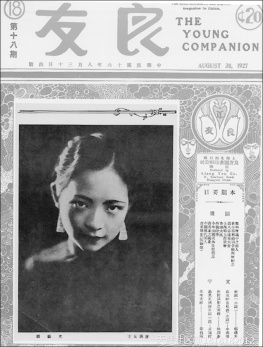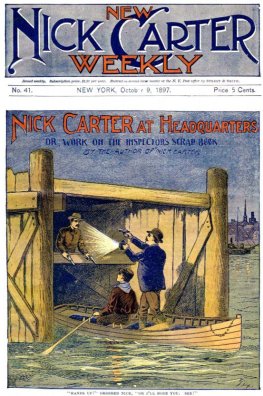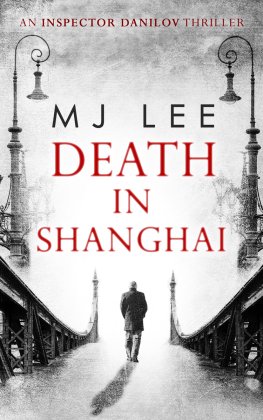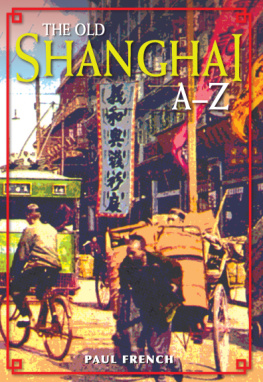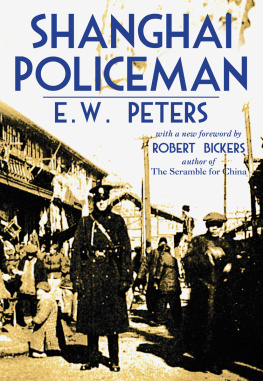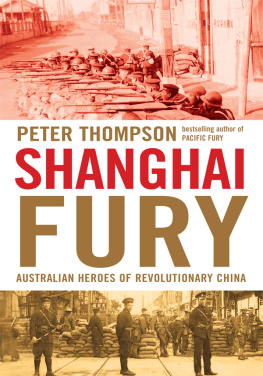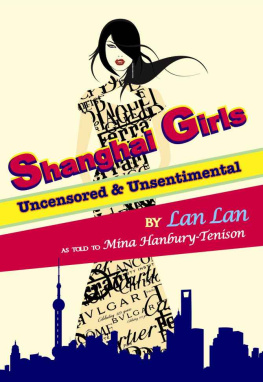James Carter - Champions Day: The End of Old Shanghai
Here you can read online James Carter - Champions Day: The End of Old Shanghai full text of the book (entire story) in english for free. Download pdf and epub, get meaning, cover and reviews about this ebook. year: 2020, publisher: W. W. Norton & Company, genre: Politics. Description of the work, (preface) as well as reviews are available. Best literature library LitArk.com created for fans of good reading and offers a wide selection of genres:
Romance novel
Science fiction
Adventure
Detective
Science
History
Home and family
Prose
Art
Politics
Computer
Non-fiction
Religion
Business
Children
Humor
Choose a favorite category and find really read worthwhile books. Enjoy immersion in the world of imagination, feel the emotions of the characters or learn something new for yourself, make an fascinating discovery.
- Book:Champions Day: The End of Old Shanghai
- Author:
- Publisher:W. W. Norton & Company
- Genre:
- Year:2020
- Rating:4 / 5
- Favourites:Add to favourites
- Your mark:
- 80
- 1
- 2
- 3
- 4
- 5
Champions Day: The End of Old Shanghai: summary, description and annotation
We offer to read an annotation, description, summary or preface (depends on what the author of the book "Champions Day: The End of Old Shanghai" wrote himself). If you haven't found the necessary information about the book — write in the comments, we will try to find it.
Champions Day: The End of Old Shanghai — read online for free the complete book (whole text) full work
Below is the text of the book, divided by pages. System saving the place of the last page read, allows you to conveniently read the book "Champions Day: The End of Old Shanghai" online for free, without having to search again every time where you left off. Put a bookmark, and you can go to the page where you finished reading at any time.
Font size:
Interval:
Bookmark:
Contents
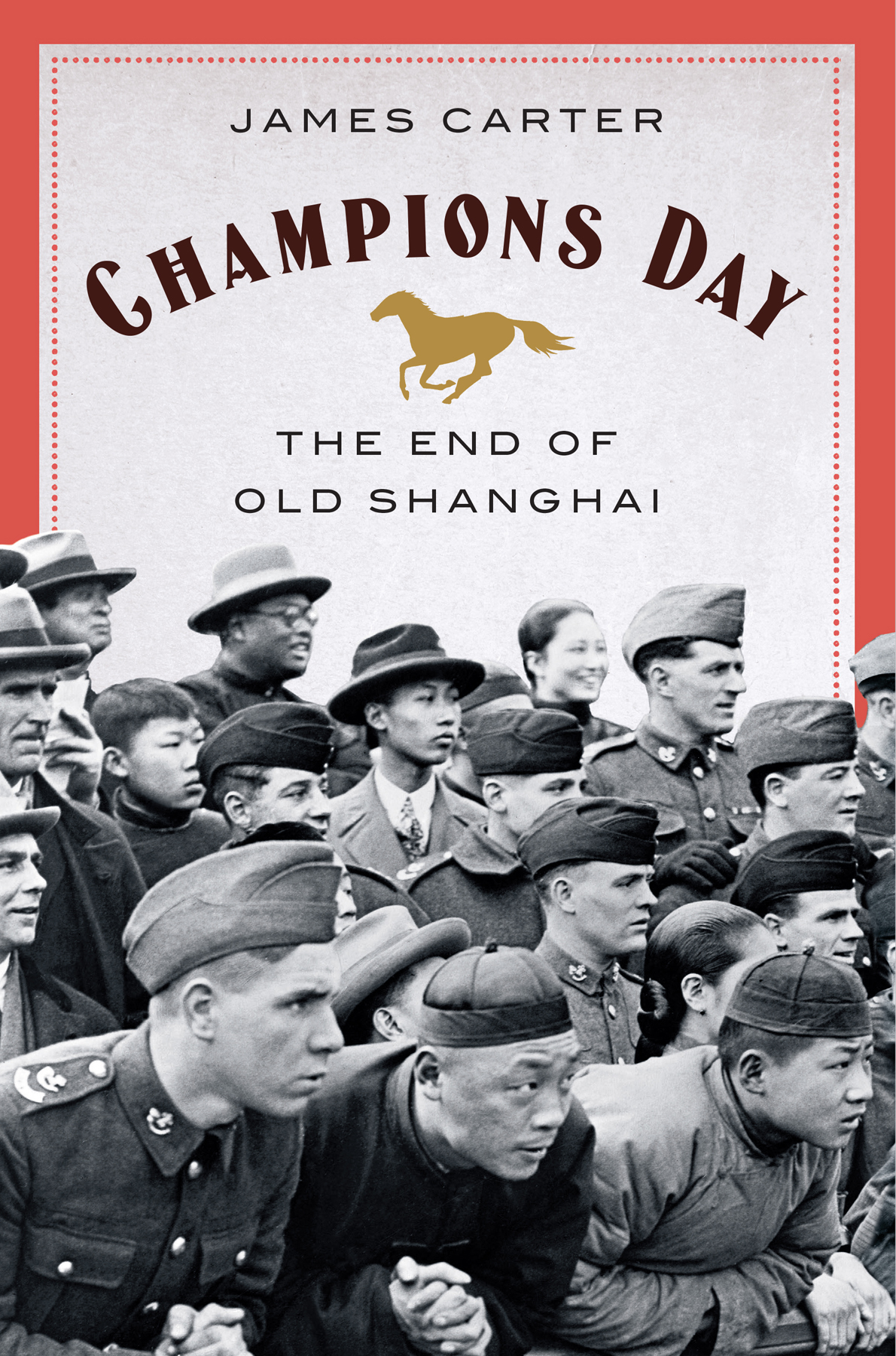
T HIS BOOK STARTED AS AN IDEA MORE THAN TEN YEARS AGO. In the course of that decade many people have helped the idea develop and change and eventually become this book. My thanks to everyone listed here, and my deep apologies to anyone I have overlooked or forgotten. It goes without saying that remaining errors of fact or interpretation are mine.
I have studied and written about China for a long while, but Shanghai is a world of its own. I could never have navigated Shanghailand without help and guidance from many experts. Chief among these were Robert Bickers, Maura Elizabeth Cunningham, and Jeff Wasserstrom, all of whom are unmatched in their kindness and generosity, not to mention expertise. Without their introductions to people, sources, and scholarship, this book could not have happened. Maura has read more than one draft of this book, and commiserated over the challenges of research and writing in and about Shanghai. This book is so much better because of her contributions, and I will always be grateful for her friendship, her introduction to Shanghai, and her skill and generosity as a writer, historian, and travel guide.
At the University of Bristol, special thanks to Jamie Carstairs at Historical Photographs of China, and to the participants in the symposium Snapshots in Time: Photography and History in Modern China.
Patrick Cranley, Tess Johnston, Tina Kanagaratnam, Greg Leck, Kent McKeever, and Bill Savadove were among other Shanghai hands who were helpful in answering questions, providing information and materials, and/or offering advice. Paul French offered advice about writing that I could not always follow, but that helped me better think about the opportunities and challenges I faced in re-creating Shanghais past in print.
Peter Law and Sarah Mellors helped me obtain images and documents from Shanghai when I could not get there myself. Paul Pickowicz and Chen Xi at UC San Diego, and Anne Mar at Occidental College, were helpful in looking for and finding images in their library collections.
Lisa Adams, Steve Platt, and Heather Cox Richardson talked with me about the process of publishing and writing, and helped me think about both in new ways, with lasting results.
In addition to all the authors who have written about Shanghais past and on whose work I have tried to build, I need to thank experts in several subfields, who helped me navigate some of the obstacles particular to those areas. For horse racing, Teresa Genaro and Candice Hare answered many questions, and Teresa consulted with me on my chapters that take place at the track. Thanks to Sandra Fahy for helping us get in touch. Other experts who provided invaluable assistance were, on Buddhism, Brooks Jessup and Erik Hammerstrom; on Shanghai Jews and the Hardoons, Joseph Sassoon; on architecture, Edward Denison, Seng Kuan, Cole Raskam, and Guangyu Ren; on Shanghai sports and clubs, Simon Drakeford and John Slusar; and on fashion and intellectual society in Shanghai, Andrew David Field and Paul Bevan (who also helped locate images of Ing Tang). Jonathan Howlett and Isabella Jackson offered helpful approaches to research in the UK.
Jennifer N. J. Chang of Academia Sinica hosted me for a delightful lunch in Taipei to talk about the Shanghai Races. Lydia Chen, Isabel Sun Chao, and Claire Chao shared personal and family recollections in phone, e-mail, and in-person interviews.
I was fortunate to work in many different archives and libraries, and I must thank the staffs at the Library of Congress in Washington, DC; the US National Archives in College Park, Maryland; the National Archives of the United Kingdom in Kew, London; the Royal Asiatic Society; the Shanghai Municipal Archives; and the Shanghai Library, especially the Xujiahui (Siccawei) branch. In Hong Kong, C. M. Yip helped with access and materials at the Hong Kong Jockey Club and Jockey Club Archives. Special thanks to Erin Sidwell at the Library of Congress and, above all, to Sarah Boyce and the rest of the staff at the Drexel Library at Saint Josephs University.
Support from the Nealis Program in Asian Studies at St. Joes helped me acquire many of the resources that made this book possible. Thanks to its benefactors, Jim and Bernadette Nealis.
The HSBC Archives in both Hong Kong and, especially, London, were invaluable. I want to thank Danielle Andrew-Lynch, Yana Fowle, and Tina Staples in London and Jenny Yu in Hong Kong. Katherine Anthony, my former student, was a diligent and thorough research assistant in London. THWND!
Sarah Dodd, Frances Weightman, and especially Peng Qipao helped me get access to unique material at the University of Leeds.
Twitter was a source of distraction, but more importantly, it helped me contact many talented scholars, authors, and even friends: Audrey Bastian, Meredith Hindley, and Bill Lascher were encouraging and enthusiastic throughout the process. Lisa Munro and Kelsey Utne helped in ways that they may not know. And Theresa Kaminski, Drew McKevitt, and Arissa Oh all very kindly read drafts of proposals and of sections of the manuscript. I look forward to returning the favor.
Katherine Flynn represented this book and helped find it a happy home at W. W. Norton. Katherines validation of what I thought a book could be was essential. I cant thank her enough for the enthusiasm, insight, and skill she put into the proposal.
No single person has had more impact on this book than my editor at W. W. Norton, Alane Salierno Mason. Her hard work and skill as an editor, enthusiasm for the project, and patience with me have made the book immeasurably better. Thanks to Reggie Hui for important criticisms that helped a lot. Copyediting only begins to describe the role that Stephanie Hiebert played in finalizing the manuscript. Thanks as well to the rest of the team at Norton, including Mo Crist, but extending to many others whose work often went unseen by me.
My colleagues at Saint Josephs Universityespecially Amber Abbas, Melissa Chakars, Chris Close, Emily Hage, Catherine Hughes, Susan Liebell, Elizabeth Morgan, Leslie Rogne Schumacher, Rich Warren, and Brian Yatesall read drafts of proposals, chapters, and parts of chapters, and I thank them for that. Alex Gould and Denise Thomas provided support that enabled me to do my job, and without them this book would not be done for a long while. Summer research grants from the provosts office at St. Joes helped me conduct this research, and I thank the Board on Faculty Research and Development for approving my applications.
I could never have undertaken the research for this book over many years without the support and encouragement of Cynthia Paces.
Ingrid Creppell, Amy Fleming, Jonathan Fleming, Jeanne Malloy, Bob Mudge, and Bill Walto provided fellowship and friendship along the wayand sometimes a place to stay on research trips too! Special thanks to Jonathan for a helpful read of an early draft. Their interest in and enthusiasm for the project was reassuring at every stage. Mary Anne Cloney may not remember, but her enthusiasm about the project many years ago, when it was just an idea, helped give me the courage to push it forward. Julia and Adam were always patient when they had to hear, again, about the horsey book!
Special thanks to the members of the 2018 Congressional Staff Delegation to China who accompanied me on my first visit to the Shanghai Race Club building, and especially to Jess Bissett for making that trip possible. At the National Committee on US-China Relations, Jan Berris, Margot Landman, and Jon Lowetand, of course, my many PIP friends and colleagueshelped encourage me with their interest and enthusiasm.
Next pageFont size:
Interval:
Bookmark:
Similar books «Champions Day: The End of Old Shanghai»
Look at similar books to Champions Day: The End of Old Shanghai. We have selected literature similar in name and meaning in the hope of providing readers with more options to find new, interesting, not yet read works.
Discussion, reviews of the book Champions Day: The End of Old Shanghai and just readers' own opinions. Leave your comments, write what you think about the work, its meaning or the main characters. Specify what exactly you liked and what you didn't like, and why you think so.

